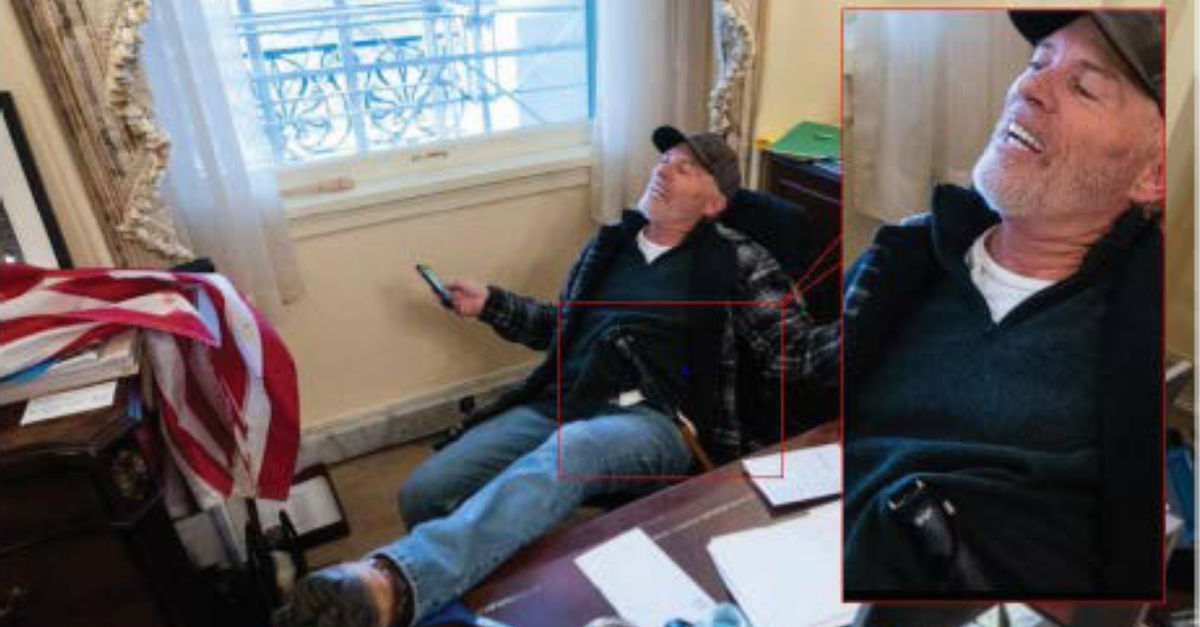
Richard Barnett, who kicked up his feet on a desk in Speaker Pelosi’s office, had a stun gun at the time.
The man photographed putting his foot up on a desk inside then-House Speaker Nancy Pelosi’s office during the Jan. 6th attack on the U.S. Capitol has been convicted of all charges.
A close-up of the photograph showed the Richard “Bigo” Barnett had a stun gun in his pants, which prosecutors identified as a Zap Hike ‘N Strike Walking Staff with spike electrodes. The government also said that Barnett left behind a note for the California Democratic politician.
“Bigo was here b—-,” he wrote, with the sexist slur originally uncensored.
His lawyers later claimed their client only used a softer word: a misspelled variation of “Biatch.”
“Instead of writing the accusatory ‘You bitch’ as the government falsely states, it only says ‘biatd’ and without the word ‘you,'” his lawyers argued in April 2021. “On information and belief, the ‘d’ was meant to be two letters, ‘c’ and ‘h’ with the ‘c’ connected to an ‘h’ to spell the word ‘biatch’ which is a slang and less offensive word for ‘bitch.'”
In the aftermath of the riot, the Arkansas man boasted about his exploits to the press and showed a reporter an envelope taken from Pelosi’s office.
“I did not steal it,” Barnett reporedly told the outlet. “I bled on it because they were macing me and I couldn’t f—— see so I figured I am in her office. I got blood on her office. I put a quarter on her desk even though she ain’t f—— worth it. And I left her a note on her desk that says ‘Nancy, Bigo was here, you b—-.’”
When he took the stand, Barnett reportedly adjusted his tone from defiance to “regrets.”
“I probably shouldn’t have put my feet on the desk,” Barnett told the jury, according to the Washington Post. “And my language.”
“I’m a Christian,” he reportedly added. “It just wasn’t good. It wasn’t who I am.”
Barnett’s eight-count superseding indictment charged him with civil disorder, obstructing an official proceeding, entering and remaining in a restricted building or grounds with a deadly weapon, theft of government property and multiple misdemeanors associated with his entering the Capitol.
A federal jury only needed roughly three hours to reach their verdict.
Shortly after his arrest on the month of the attack, a federal judge refused to let Barnett post bond, describing the image of the defendant as “brazen,” “entitled,” and “dangerous.”
“The government has presented overwhelming evidence that this defendant, Richard Barnett, enthusiastically participated in this assault on the Capitol,” Chief U.S. District Judge Beryl Howell said at the time.
The case would later be reassigned to U.S. District Judge Christopher Reid Cooper, who will sentence Barnett on May 3.
Barnett faces a maximum sentence of 47 years inside a federal prison.
One of Barnett’s attorneys did not immediately respond to an email requesting comment.
Update—Jan. 23 at 1:41 PM ET: This story has been updated to include more context.
This is a developing story.